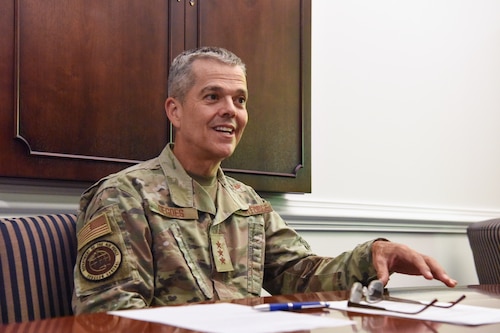As the Air Force Medical Service continues its transformation to meet the evolving needs of Airmen and Guardians, Lt. Gen. John J. DeGoes, the U.S. Air Force and Space Force surgeon general, outlined his vision for implementing four AFMS strategic imperatives to ensure health and medical readiness.
DeGoes, who became the Air Force's 25th surgeon general July 31, said addressing the complex challenges of future warfare requires an expansive overhaul of the AFMS and the training of service members within the system.
1. Deliver DAF integrated operational capabilities
Integrating tailored medical capabilities into operational units
Unquestionably, the foremost priority is providing operationally relevant medical capabilities that are fully integrated into units of action from day one. Medics will train, certify, and deploy together while providing combat medical support to the installation to maximize home station readiness.
"Our future challenges require a different approach," DeGoes said. "It's going to require a different kind of organizing, training, and equipping. It necessitates training together, knowing the people you're going to serve. More of the mission for the future also involves returning folks to duty."
As the Department of the Air Force continues to prepare for Great Power Competition, medics have to be adaptive, agile and innovative in any given scenario, especially in an environment that may be contested, where manpower and additional resources may be limited.
"We have to be more hardened, more resilient," DeGoes explained. "If the base that we're at is not a sanctuary, we need to be equipped and prepared to use our capabilities and have the confidence to carry out the mission."
Support for active-duty members and families
Family readiness is a critical component of force readiness, according to DeGoes. He emphasized the AFMS must transform into a people-centric operation - one that supports not only the service member deployed to the battlefield, but also their family at home.
"You can't be completely ready as an Airman or Guardian if your family is not ready and taken care of," DeGoes explained. "Once we have that combat mission, families and other active-duty members remaining at installation will still have our support."
2. Joint force readiness support
Enhancing joint patient movement capability, capacity, interoperability, and casualty care
Unified efforts to strategically align AFMS medical forces with the operational Air Force, Space Force, and joint force remain vital to generating readiness, particularly for emergency rapid responses.
In recent years, the Department of Defense and Defense Health Agency Joint Trauma System developed Tactical Combat Casualty Care courses for evidence-based training, life-saving techniques, and strategies to provide top-tier battlefield trauma care across the services.
Emphasis on continued innovations in various medical components, including Medic-X training, expeditionary medical support, en route patient care, aeromedical evacuation, and Critical Care Air Transport Teams will enable medical capabilities to sustain patient movement and casualty care in a complex, contested environment.
3. Medical force development
Continuing advanced training and education of service members
In conjunction with readiness support, the AFMS remains focused on its strategic imperative to invest in advanced medical, dental, allied health education and prioritizes proficiency in medical capabilities while maintaining the necessary education and skill sets to optimize readiness, recruitment, and retention.
DeGoes stressed the importance of improving the efficiency and effectiveness of medical forces without sacrificing essential combat medical support in a resource-constrained environment.
"Innovating in the medical readiness space is going to be critical to military medicine's part in national security," DeGoes stated. "I see machine learning and artificial intelligence as enabling future medics to do more with less. The spirit of innovation is key to moving forward."
4. Providing a medically ready force
Delivering healthcare benefits through partnership with the Defense Health Agency
Through the 2017 National Defense Authorization Act, Congress directed the transfer of administration and management of military treatment facilities to the DHA to standardize care across all services and establish an integrated Military Health System. AFMS has been collaborating with the agency to deliver comprehensive healthcare benefits to beneficiaries while ensuring Airmen and Guardians are medically ready for missions.
DeGoes envisions a continued partnership with the DHA to ensure efficient healthcare delivery through integrated resources, technology, and medical expertise. Together, the DHA and AFMS have streamlined these services to enhance the quality of care and improve all patient outcomes.
"Our partnership will enable us to optimize readiness through providing safe, high-quality healthcare for all service members, families, and beneficiaries," he said. "To stay the greatest Air Force, it requires the best healthcare whether at home or at any contingency."







